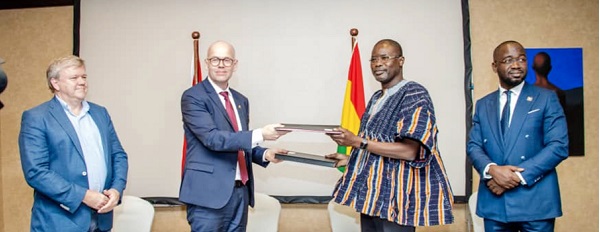
GWCL, Danish company sign technology transfer pact
The Ghana Water Company Limited (GWCL) and Arhaus Vand (Arhaus Water) of Denmark have signed a three-year (2023-2025) memorandum of understanding (MoU) in Accra to improve the GWCL’s capacity through technology.
The Managing Director of the GWCL, Dr Clifford Braimah, signed for the company, while the Managing Director of Aarhus Vand, Henrik Seiding, signed on behalf of the Danish outfit.
Under the MoU, Denmark would support Ghana to increase its capacity in the water sector through technology transfer.
Dubbed the Strategic Sector Cooperation, the partnership is to enable Ghana to address water delivery, non-revenue water and wastewater treatment, with the deployment of Danish solutions, technologies and experiences.
Achieving SDGs
The Danish Ambassador to Ghana, Tom Nørring, indicated that the focus of the cooperation was on wastewater treatment and non-revenue water demands.
He noted that the implementation of the project would directly contribute to achieving Goal 6 of the United Nations Sustainable Development Goals on clean water and sanitation to improve the lives of the people.
Mr Nørring indicated that already, the Aveyime Water Project — which is presently being funded by the Danish Sustainable Infrastructure Finance to improve water supply to residents and citizens in the eastern part of Accra — has provided unique opportunities for officials of the two agencies to be abreast of smart water solutions.
“These are fruitful partnerships that we hope will work extremely well and ensure that GWCL will again be a beacon other utilities in Africa will look up to,” Mr Nørring said.
He said while the partners were on course to achieving the set objectives of reducing non-revenue water to the barest minimum, it would also be important to replicate the knowledge gained from the project in the other regions of Ghana.
Losses, protection
Mr Seiding indicated that Aarhus had over the decades worked on issues of water losses and protection, resource efficiency and the overall development of smart and cost-effective solutions that delivered service to their citizens and industries.
“On our part, we have learnt a lot and I am glad we can share experiences with Ghana Water so they can use the opportunity to also create jobs,” he said.
Similarly, he said, the involvement of the private sector and academia remained crucial to finding sustainable solutions to Ghana’s water challenges, adding that “I look forward to the project blossoming”.
Pollution
Dr Braimah said the increasing rate of pollution of water bodies continued to pose a threat to Ghana’s water production.
He pointed out that the company had to rely heavily on chemicals to enable it to produce clean water for domestic use.
He expressed the hope that the renewal of the partnership would afford the company the needed capacity to help it build the needed data infrastructure to also address the challenges of non-revenue water.
